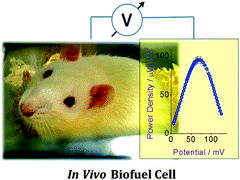An intravenous implantable glucose/dioxygen biofuel cell with modified flexible carbon fiber electrodes†
Abstract
An intravenous implantable

* Corresponding authors
a
Centro de Ciências Naturais e Humanas, Universidade Federal do ABC CEP: 09210-970, Santo ndré, SP, Brazil
Tel: 11 4996 7960
b
Instituto de Química de São Carlos, IQSC, Universidade de São Paulo, USP, CEP: 13560-970, São Carlos, SP, Brazil
E-mail:
frankcrespilho@iqsc.usp.br
Fax: 16 3373 9903
Tel: 16 3373 9946
An intravenous implantable

 Please wait while we load your content...
Something went wrong. Try again?
Please wait while we load your content...
Something went wrong. Try again?
F. C. P. F. Sales, R. M. Iost, M. V. A. Martins, M. C. Almeida and F. N. Crespilho, Lab Chip, 2013, 13, 468 DOI: 10.1039/C2LC41007A
To request permission to reproduce material from this article, please go to the Copyright Clearance Center request page.
If you are an author contributing to an RSC publication, you do not need to request permission provided correct acknowledgement is given.
If you are the author of this article, you do not need to request permission to reproduce figures and diagrams provided correct acknowledgement is given. If you want to reproduce the whole article in a third-party publication (excluding your thesis/dissertation for which permission is not required) please go to the Copyright Clearance Center request page.
Read more about how to correctly acknowledge RSC content.
 Fetching data from CrossRef.
Fetching data from CrossRef.
This may take some time to load.
Loading related content
